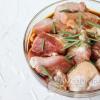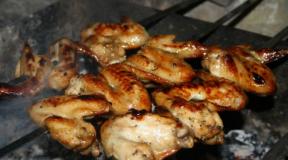What spices are suitable for products. Spices and temperament: what food supplements suit me (pass the test inside)
No kitchen of the world is complete without spices. And now it is almost impossible to find a hostess who would not use a single seasoning. Their fragrances work wonders with simple products! And the simplest dish can instantly become a culinary masterpiece in the hands of a master who knows how to choose the right spices. And indeed, the same spice can exalt one dish, perfectly emphasizing and complementing its taste, and in the same way completely spoil the other. It is all a matter of combination with certain products. It is not invented by me, not by contemporaries. The origins of the use of one or another spice come from time immemorial, from time to time. Let’s work with “Very Delicious” to find out which spice is suitable for which product.
For meat
Meat is a rather nourishing, high-calorie product, and it is suitable for seasoning with a sharp taste and aroma. But each type of meat is impressed by different spices:
- pork: all kinds of peppers, onions, turmeric, bay leaf, paprika, rosemary, basil, ginger, nutmeg, cumin, cardamom, cinnamon, oregano, juniper;
- beef: sage, tarragon, basil, thyme, variety of peppers, cinnamon;
- lamb: anise, peppermint, basil, black, pepper (red and sweet), sweet flag, cloves, cumin, bay leaf, rosemary, marjoram and tarragon.
Another very important thing: in hot meat dishes (fried, boiled, stewed) spices are added 1-2 minutes before being removed from the stove or into a ready, but still hot product. When smoked, baked - at the beginning.
For grill
When cooking on the grill, your products are already soaked with the delicious, fragrant aroma of smoke. And the spices here should be spicy, spicy, bright (taste-enhancing), so that at the level with a very fragrant aroma the dish does not seem tasteless. All sorts of peppers, ginger, nutmeg and color, cardamom, thyme, cumin, marjoram - exactly what you need to cook your grilled dishes.
For poultry and game
Poultry meat has a more delicate and delicate taste. Therefore, poultry dishes are best combined with thyme, rosemary, marjoram, curry, turmeric, basil, sage and ginger.
Game meat has a bit of a specific taste and smell. Accordingly, the spices will suit with a sharper aroma that can hide a special smell (allspice and red pepper, rosemary, basil, thyme, sage, juniper, tarragon).
For pates
But in a pate you can put white, allspice, bay leaf, ginger, cloves, cinnamon, cardamom, onions, garlic. They gently decorate the delicate structure of the pate, giving them a slight sharpness and piquancy.
For fish
Depending on whether you have river or sea fish, and you need to select different spices. River fish has no bright meat taste. Accordingly, spices are used special - enhancing taste: sharp, fragrant, with a pronounced aroma. Perfect coriander, thyme, nutmeg, turmeric, allspice, bay leaf, onion, celery, dill and parsley.
Sea fish has a more pronounced taste, but it has a specific smell. And the seasonings here are applied more relaxed: complementing and so rich taste and slightly smoothing excessive marine flavor. Therefore, it will be correct to use ginger, nutmeg, thyme, a mixture of peppers, lemon balm, saffron, bay leaf, onion and parsley.
For marinades
When canning, they mainly use bay leaves, dill, parsley (preferably mature stems or dried herbs - they have a more intense flavor), onions, garlic, black and allspice, coriander.
For vegetables
Vegetables are best combined with soft, non-aggressive spices that lightly adorn their delicate taste and aroma:
- for potatoes: onion, dill, celery, bay leaf, thyme, ginger, basil, turmeric;
- for cabbage: coriander, cumin, cumin, fennel, onion, garlic and marjoram;
- for legumes: asafoetida (in small quantities), black and allspice, ginger, cumin, coriander, nutmeg; legumes - a more satisfying product, and seasonings are selected more sharply.
For fruit
Dishes that are made from fruits (compotes, juices, fruit salads) are seasoned with spices that have a sugary taste and aroma. For such dishes, cinnamon, cloves, star anise, anise, ginger, cardamom are perfect.
For baking
As for fruit dishes, spices with a sweetish smell are selected that emphasize the taste and sweetness of the product itself. Therefore, the best seasoning in baking is cinnamon, clove, cumin, cinnamon, star anise, anise, ginger, cardamom, vanilla, and saffron.
For hot milk
It goes well with hot milk saffron, which also contributes to its absorption. Please note: it is added in very small quantities! You can also add a little cinnamon or cardamom to the milk.
If you follow these tips, your dishes will always be tasty and fragrant. But do not forget: taste is a delicate matter! And how many people, so many tastes. So do not worry if you have not seen your favorite spice in the recommendations for the preparation of a particular dish. Add it - the main thing that you like. And also: do not hesitate to experiment, because the world-famous culinary masterpieces also came up with people!
"Very tasty" wishes you bon appetite and good mood!
In the article, we talk about spices, talk about their useful properties and use in cooking. You will learn what kinds of spices are, what seasonings and spices are good for health. Using our tips, you will learn how to choose the right flavors for dishes.
Spices or spices - food additives of plant origin. Possess persistent taste and aroma. The role of spices does not end with the improvement of the taste of the dish - they promote digestion and extend the shelf life of products.
In Russia, spices were called spices, from the word “pepper” - the first known flavor. Do not confuse spices with seasonings, under the latter also imply salt, sugar, vinegar and other additives not of plant origin.
As spices, various parts of plants are used: leaves, stems, roots, flowers, fruits, seeds, bark and peel.
Useful properties of spices
Overview of popular spices and seasonings.
Spices promote active secretion of gastric juice and improve the process of digestion. Depending on the chemical composition of food additives have a range of useful properties.
Many herbs are used to normalize blood pressure and heart rate. Valerian, mint and lemon balm reduce blood pressure, eliminate tachycardia, calm the nervous system and relieve headache. If you suffer from hypotension, use rosemary, turmeric, and hot red pepper in moderate dosages.
To enhance immunity, drink tea with ginger. Garlic, fennel and oregano have an immunomodulatory effect.
Eliminate pain in the head and body will help saffron, cinnamon, cloves, cumin and black pepper. In more detail about the efficiencies of each spice we told in separate articles.
Spice Types
There is a huge amount of spices - hot spices, sweet spices, spicy vegetables and herbs. To understand this diversity is often difficult.
In the table we gave you the taste characteristics of the most popular spices and dishes to which they are added.
Spice table:
| Title | Taste | Where add |
| Cinnamon | Sweet, warm, burning, tart-astringent. | Cinnamon is used to make fragrant pastries, desserts, chocolate, hot soft and alcoholic drinks, for example, mulled wine. Ideal cinnamon with apples. |
| Carnation | Burning taste and a peculiar strong smell, contains essential oil. | Used in the manufacture of marinades, added to meat and fish dishes, confectionery, fruit drinks and preserves. |
| Cardamom | Strong sweetish spicy taste and aroma. Contains essential oil. | Add to pastries, confectionery and drinks. With cardamom make coffee, tea, prepare hot alcoholic cocktails. |
| Ginger | Pungent burning taste and aromatic characteristic odor. | Ginger is most often added to pastries, alcoholic and non-alcoholic beverages, and sauces to main dishes. |
| Turmeric | Weak, pleasant, in large quantities - sharp, burning. | Add to soups, vegetable stews, meat and fish dishes, sauces, confectionery. |
| Nutmeg | Hot-spicy taste and peculiar aroma. | Nutmeg is a versatile seasoning. It is added to meat and fish dishes, rice dishes and vegetables, salty and sweet sauces. Most often used for baking, making confectionery, compotes, jams and jams. |
| Black pepper | Burning, sharp. | Used for cooking soups, meat, fish and vegetable dishes, salads, sauces. Add to marinades, canned food, pickles. |
| Allspice | Spicy and burning taste that resembles a mixture of cinnamon, nutmeg and cloves. | Add to meat the first and second dishes, marinades, canned food, sauces. It is best combined with grilled meat and game. Often used for pickling cucumbers. |
| Cayenne pepper | Very sharp, burning. | Add to meat dishes, dishes from legumes, sauces. To add a hot taste, cayenne pepper is added to chocolate and chocolate pastries. |
| Rosemary | Strong sweetish and camphor aroma, reminiscent of the smell of pine. The taste is spicy, spicy. | Most often added to fish and vegetable dishes, to fried meat and poultry. Rosemary-based syrups are made, which are added to pastries and drinks. |
| Saffron | Bitter spicy taste and strong peculiar aroma. | Add to rice dishes, peas. In a small amount used in the preparation of red meat, fish soups and vegetable broths. |
| Zira | Bitter nutty taste and smell. | In most cases, used for pilaf and other rice dishes, add to meat dishes, marinades. |
| Thyme | Spicy spicy taste and strong pleasant aroma. | Thyme can be added to almost all dishes, it goes well with meat, fish, vegetables. Sprigs of plants are added as a flavoring to sweet and salty pastries, drinks. |
| Basil | Spicy flavor and pleasant smell. | Basil is added to pasta, pizza, meats, soups, salads and sauces. |
| Oregano | Pleasant spicy taste and aroma. | Use for chicken and fish, add to the stuffing for pizza and pies, sauces and marinades. |
Read more about some spices in the following video:
Health spices
At the beginning of the article we already said that spices are good for health. Below is a list of the most useful spices.
Remember that spice treatment can only be carried out as an auxiliary measure to the main therapy. Before using spices for medicinal purposes, read the contraindications and consult your doctor. The benefits and harms of spices depend on the dosage and application.
Slimming Spices
Many spices improve metabolism and digestion, and some even contribute to the breakdown of fat. Below we have presented the most effective spices for weight loss.
What spices can be used to reduce excess weight and why:
| Title | How does | How to apply |
| Ginger | Improves digestion and activates metabolism. Due to the burning taste, ginger accelerates blood circulation, which contributes to the active burning of fats. | Crush 100 g of fresh ginger and pour 500 ml of boiled hot water. Insist 1 hour. Use 2-3 times a day for 1 glass of product, drink a drink after a meal. |
| Cinnamon | It speeds up metabolism and improves digestion, lowers blood sugar levels and controls appetite, and also dulls the feeling of hunger. | Add ½ tsp. ground cinnamon in a glass of kefir. Replace the last meal with a drink or drink 1 hour after a meal, preferably before bedtime. |
| Caraway | Improves digestion, normalizes lipid metabolism. | Pour 1 tbsp. seed a glass of boiling water, leave for 1 hour. Strain the drink and drink 1 time before the last meal. |
| Mint | Relieves stress, which is inherent in experiencing people on a diet, eliminates bloating, reduces appetite. | Fill 6 mint leaves with 1 liter of boiled water. Insist 20-30 minutes. Take the broth warm 3-4 times a day for 1 glass. |
| Black pepper | It stimulates the production of gastric juice and improves the digestive process, accelerates metabolic processes and promotes fat burning. | In 500 ml of hot boiled water, stir a tablespoon of honey and the same amount of grated ginger. Add 1 tablespoon of lemon juice and black pepper on the tip of a knife. Take a warm drink 1 glass 2 times a day. |
| Rosemary | It improves blood circulation and stimulates metabolism. | Pour 1 tablespoon of rosemary with 500 ml of water, leave for 30 minutes. Take half or half a glass, you can sweeten with honey. |
| Anise | Reduces appetite, improves performance and improves mood. | Pour 5 grams of anise glass of boiling water. leave for 30 minutes, strain. Take a decoction of 1/3 cup 3 times a day 30 minutes before meals. |
Spice aphrodisiacs
Some spices are strong aphrodisiacs. They increase sexual desire, increase sexuality and sensuality.
Spices - aphrodisiacs for women:
- Anise - inflames passion between partners.
- Vanilla - awakens femininity and enhances sensuality.
- Cinnamon - enhances desire, provides a rush of blood to the intimate organs and increases the tone of the uterus.
- Cardamom - increases sexual desire.
- Chili pepper - enhances the sensuality of erogenous zones.
- Nutmeg - increases sexual desire and increases sexuality.
Spices - aphrodisiacs for men:
- Ginger - increases male power, provides prolonged sexual intercourse, improves blood circulation in the genitals.
- Coriander - increase attraction to the opposite sex.
- Marjoram - relaxes the body and increases libido.
- Saffron - increases sensitivity.
- Pepper - improves blood circulation and increases sensitivity.
- Savory - increases male power and prolongs sexual intercourse.
What spices can children
Adding spices to the diet of babies is recommended from 2-4 years of age, depending on the spice itself. For example, dill can be entered in the menu already 10-month-old child, and from the use of black pepper is better to refrain up to 5 years of age.
What spices are allowed for children from 2 years:
- dill;
- fennel (from 4 months);
- parsley (from 10 months);
- basil;
- ginger;
- cinnamon;
- garlic.
What spices are contraindicated for children under 5 years:
- red hot pepper;
- saffron;
- turmeric;
- mustard;
- horseradish;
- coriander.
On the introduction of these spices in the menu of a child over 5 years, consult a pediatrician.
Spice Storage
Spices should be stored in glass or wooden jars in a dry and dark place. Whole spices have a longer shelf life than ground ones. Below are the expiration dates for different species.
Whole spices and herbs:
- leaves and flowers - 1-2 years;
- seeds 2-3 years;
- root crops - 3 years.
Ground spices:
- leaves and flowers - 1 year;
- seeds - 1 year;
- root vegetables - 2 years.
What to remember
- Spices or spices are herbal flavors.
- Spices have a pronounced taste and aroma, they are added to food in small quantities.
- Spices have useful properties, they are used for the treatment and prevention of diseases. Before using condiments for medicinal purposes, consult your doctor.
We eat to live, and the quality of life depends on what we eat. A balanced diet gives the body a source of strength, health and energy. In today's publication, we consider which spices (spices) are suitable for you depending on the type of your temperament. We take four nationalities as a basis (according to the types of temperament), analyze their national cuisine and draw up lists of the spices they use.
Do you know your temperament
Temperament consists of the qualities that prevail in man. The combination of these signs (mainly indicators of introversion-extraversion and neuroticism, or stability) determines its response to relationships with other people, efficiency, and emotional response to life situations.
4 temperaments can be graphically depicted using the Eysenk circle, where:
- the combination of stability and extroversion gives a sanguine type,
- stability and introversion - phlegmatic,
- instability and extraversion causes choleric,
- instability and introversion - melancholic.
If you still do not know your temperament, you can take the test now.
Characteristics of temperaments and comparing them with ethnic groups
Well, when will we get to the spices? A little patience. First, we will characterize each type of temperament and immediately draw parallels with one of the nations, whose mentality corresponds to the description.
- Sanguine men - emotional, cheerful, sociable; seek to achieve goals at any cost; artistic, efficient, like to be in the center of attention, to lead. Well, how can you not remember the Americans with their constant “chi-and-i-z” and “hi”, the desire for world domination and weekly holidays once a year?
- Choleric- fervent, energetic, impetuous, courageous, quick-tempered and impatient with a fast pace of speech. In my opinion, the description fit the Spaniards with their rodeo, conquistadors, "Baylamos".
- Phlegmatic -amaze with their calmness and equanimity. They are conservative, slow, do not like innovation, careful, disciplined. Of course - these are prudent British! Just remember: "Porridge, sir!"
- Melancholic - vulnerable but creative experiences are poured into paintings, prose, and poetry. They can work productively, but under special conditions: so that they “do not strain”; troubles knock them out of the rut, but, starting to act, they overcome them. Sometimes they seem to be “nihilists”, but this is only an outward manifestation of internal “torments”. It seems that melancholic - Russian. This proves a huge number of poets and artists of the classics, "Russian roulette", fatalism.
Temperament and spices on the example of traditional dishes
Now consider what seasonings and spices "live" in the kitchen of the peoples, the temperaments of which we identified.
Sanguine Americans
Americans are a synthesis of cultures, so their cuisine has absorbed the traditions of the peoples who joined the territory of the American continent. As true sanguine, they are friendly to alien taste preferences, but they are characterized by maximalism. If the dish is peppered, then it is well peppered, if spicy, then "with a capital letter." Most likely, flavoring additives do not shine with naturalness, because sanguine people have no time to cook food in detail, they prefer fast food.
However, supermarket shelves literally bursting with spices. Shelves take place about 2 meters in height and 4-30 meters in width, depending on the size of the room.
Traditional dishes - burgers, chips, barbecue, pickled beans, turkey with sage, salad with celery. Traditional spices for America include,, and.
Spanish choleric
Spanish cuisine is famous for its "Mediterranean diet" with an abundance of meat food. As meat seasonings are used:, chili, garlic. Vegetable dishes - paella and gazpacho are not complete without saffron, garlic, celery. As dressing for salads go spicy oils and vinegar, infused with herbs. Desserts (eg, Catalan cream) include.
Spain is also famous for its cheeses with the addition of herbs and paprika, aromatic wines and liqueurs with mint, sausages with garlic and other spices.
English phlegmatic
The British blindly adhere to the traditions, stingy on the flavorings. Spices and herbs in the diet is used extremely rarely, more in the form of oil or vinegar tinctures. However, if some spicy plant grows on the windowsill, his chances of getting into the salad increase.
Windsor soup - the most "specific" dish with vinegar. The rest of the food is served without seasonings and sauces.
Russian melancholic
Russian cuisine includes a variety of dishes included in the diet of the peoples inhabiting the territory. From the main delicacies, we immediately recall pancakes, gingerbreads, breads, pickled and pickled vegetables, peppercorns, bacon and garlic.
Traditional can be called garlic, onion, black pepper, laurel, horseradish and mustard.
Spices and temperament in the table
Based on the analysis of the dishes of the above peoples, you can make the following table:
|
SANGVINIKI |
Cholerica |
Phlegmatic |
Melancholics |
| Pepper, Oregano, Nutmeg, Carnation Cinnamon, Laurel, Tarragon, Caraway, Vanilla, Bow, Dill, Garlic, Sumac, Chilli, Ginger, Juniper, Amaranth, Salt |
Garlic, Chilli, Bow, Vinegar, Celery (leaves and scapes), Anise, Paprika, Cinnamon, Sagebrush, Mint, Lavender, Nutmeg, Thyme |
Vinegar, Anise ordinary, Salt |
Bow, Pepper black and red, Mustard, Parsley, Dill, Garlic, Horseradish, Parsnip, Bay leaf, Ginger |
Since there is no temperament in its pure form, nutritionists advise to adhere to the following foods in the diet: For sanguine and choleric people: dill, coriander, cinnamon, garlic, celery, onion; For melancholic and phlegmatic: saffron, lavrushka, cloves, ginger, peppers, cumin, horseradish, mustard, cinnamon, celery, garlic, onions.
Can the use of spices affect temperament
Temperament refers to the individual characteristics, which can only be changed with the help of willpower. The following spices will come to the rescue:
- Ginger will make you more resistant to troubles, help you easily remember the difficult, achieve your goals, become bolder;
- Nutmeghelp to recuperate and concentrate on its activities;
- With cuminyou will overcome bad habits, develop willpower, react to gossip about you less painfully;
- Turmeric will relieve from fussiness;
- Corianderwill help to become independent of the opinions of other people, especially negative ones;
- promotes kindness, peace, improves the ability to mutual understanding;
- Cardamom eliminates greed, helps to forgive someone and acquire humility and meekness.
Share your observations on the subject of spices and temperament. Any disagreement is ready to discuss. ![]()
Spices and temperament: what food supplements suit me (pass the test inside)



















